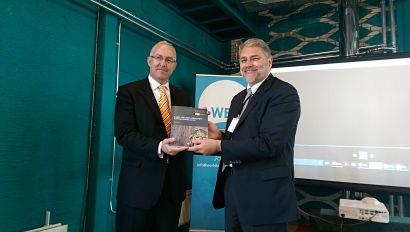
The report puts particular emphasis on the importance of separately collecting and treating inedible food waste, which if implemented on a global level would have the same impact in terms of CO2 emissions reduction as taking all cars in the EU off the road. Most cities around the world currently do not collect food waste separately, leaving it to be disposed of in dumps, landfills or incinerators. As a result, food waste is not treated and loses its potential to resolve a series of environmental issues faced by all cities.
The report also highlights the role of biogas technologies, which through anaerobic digestion (AD) recycle inedible food waste into renewable heat and power, clean transport fuel, and nutrient-rich biofertiliser. AD technologies are mature, ready-to-implement, and cost-effective. They allow maximum recovery of resources for both green energy generation and soil restoration.
The report was launched at Blue City, an incubator for circular-economy entrepreneurs based in Rotterdam. The city has developed a strong reputation for being ‘green’, and is aiming to develop the most sustainable port in the world. The Mayor of the City of Rotterdam, His Excellency Ahmed Aboutaleb, was presented with a copy of the report to mark its publication.
As well as presentations from the report's authors, the launch also featured presentations on food waste and the circular economy from sustainability platform Holland Circular Hotspot and from Blue City itself.
“Cities worldwide have to focus on one of the greatest challenges of our century: to ensure balanced progress in terms of economic growth, quality of life, safety and sustainability” said His Excellency Ahmed Aboutaleb, Mayor of Rotterdam. “We therefore welcome the report from WBA and C40 because it gives a series of implementation guidelines which will be useful on how to use wasted food to produce fuels, nutrients and heat. This is one way we can reduce the impact of climate change and shift the economy as we know it into new models, structures and meaningfulness”.
David Newman, President of the WBA, added that the time to fight climate change is now and that there is no time left to talk as we are set to lock in emissions for a 2°C temperature rise over the next five years. Mr Newman said that cities have a fundamental role to play and a brilliant opportunity to seize in cutting emissions as over half the world’s population now lives in urban areas.
Image: Presentation of WBA report to Mayor of Rotterdam
For additional information:

